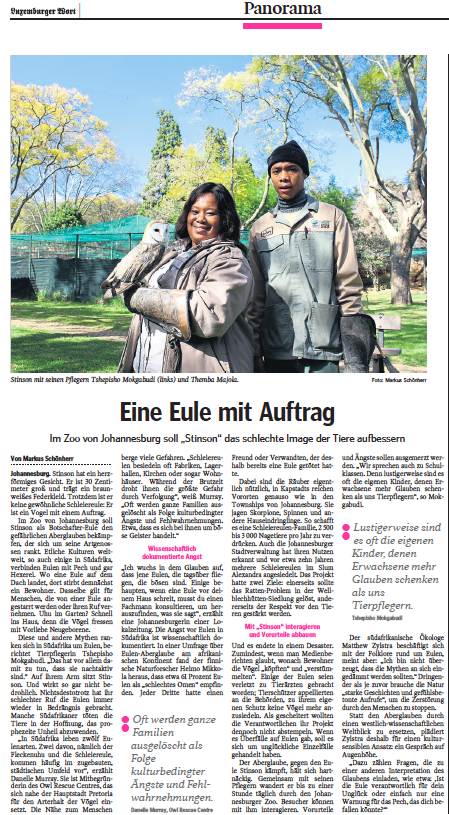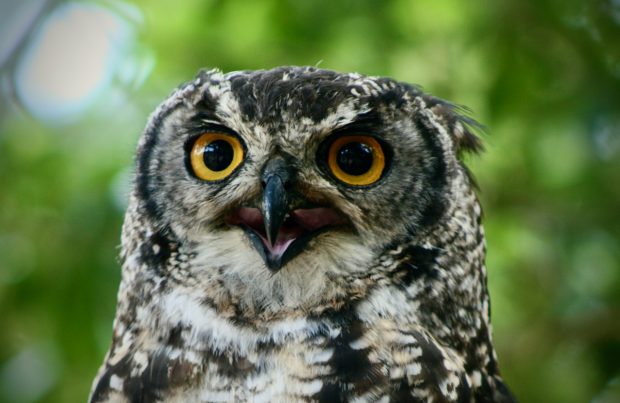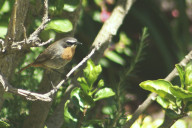Curiously, the most viewed article on eyes4earth.org is one I wrote over a decade ago called “Don’t Kill the Messenger“. It was somewhat esoteric yet still gets plenty of reads. It was picked up on by a European journalist who subsequently contacted me for a German language article he wanted to write about the persecution of owls in many parts of Southern Africa.
Very little of what I shared with him as response to his questions made it into the final article (see German version below) so I thought I would share some of my responses here re where I stand on the issue:
Q: Has the superstition surrounding owls in South Africa contributed to some species’ endangerment? In which way?
In some areas of South Africa these behaviours threaten local or regional owl populations, but the (meta-) population of most species across South Africa is in a reasonable state, although in general decline. Whilst I obviously cannot condone owl killings for whatever reason, I do think we need to place the mortality due to superstition in context: habitat loss/degradation, electrical power lines, roadside collisions and climate change are arguably much larger threats to owls. For example, two of the most vulnerable owl species in South Africa – the Grass Owl and Pel’s Fishing Owl – are most threatened by grassland disturbance and river siltation and pollution, respectively. I also wonder how many species have been helped (i.e. left alone, respected or protected) by so-called “superstition” over the years. We will probably never know the answer, although there is good evidence that “sacred natural sites” and “sacred animals (e.g. totems)” can benefit conservation and biodiversity outcomes.
So it can work both ways.
Q: How could those myths be curbed in order to save the owls’ reputation?
I am not convinced the myths should be curbed per se. More than ever, global nature needs powerful stories and emotive appeal to help humanity curb its destruction. Reducing nature to the materialist language of “resources” for consumptive benefit and capital gain is arguably more damaging than instilling it with the myth, magic and meaning characterised by more intact non-Westernised cultures. The “problem” of “superstition” is often the result of a traditional belief that has lost its original systems context and the ecological knowledge that accompanied it. (Although note that owls are subject to similar beliefs across many cultures, globally, including European folklore)
So rather than an “educate them” directive , which tends to elevate the Western (scientific) worldview as being better and the other as inferior or ignorant, I would rather encourage “engagement”: that is, understanding the nature of the problem in the local context by listening to fears/concerns and having empathetic conservations that sensitively present options and alternatives in favour of the owl and its beneficial role in the local ecology. This may also involve questions which invite different interpretations of the belief, e.g. “Is the owl responsible for your bad luck is it a simply a messenger or warning for bad luck that may befall you?”
This article contains approaches that I support, if delivered with sensitivity.
As conservationists, I don’t think we can pick and choose which part of a cultural belief system we want, and which we wish to reject. And we certainly cannot reject an entire cultural worldview simply on the basis of specific elements we find uncomfortable. Similarly, we need to interrogate our own (Western) worldviews and how that also contributes to species persecution. We need to realise that some non-Western worldviews, however awkward in parts, could well become much-needed allies in inspiring nature conservation into the future.
My views here are my own and not necessarily those of my affiliations. Thank you.













1 Comment
Hi Matthew,
Great to meet you yesterday 7/20/23 on the zoom Nature coincidence. I shared about my Great Horned Owl experience. So I was delighted today to read these articles on Owls. synchronicity continues. Thank you for what you’re doing.
This will prompt me to write the full story of this Owl family